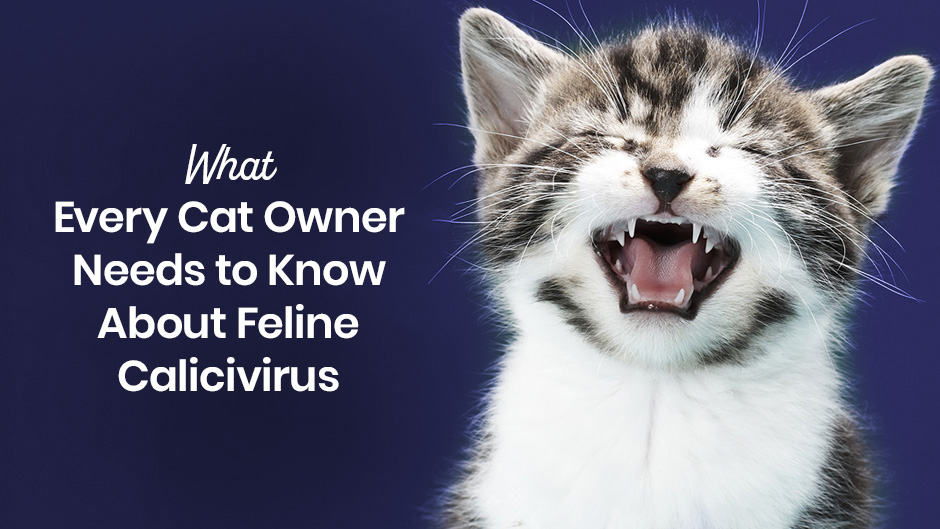Feline calicivirus is a common upper respiratory infection that can spread quickly among cats in close quarters and those who haven't received a vaccination against it. Since it's much more common in very young kittens, you need to use extra precaution when you introduce a new kitten to a household that already has cats. In fact, you should plan to isolate the kitten and older cats for five to seven days to ensure that everyone remains healthy during the transition period.
Calicivirus has symptoms similar to what a person suffering from a cold or the flu might experience. Your cat's symptoms may be only mild or they could become quite severe. However, calicivirus is rarely life-threatening and cats can only transmit it to each other and not people or other species of animals.
How Calicivirus Spreads
Cats who live in unsanitary conditions and those who have not received a vaccination are most at risk of acquiring this virus. It can spread very quickly in boarding facilities and animal shelters. This is the reason why Minnesota Veterinary Hospital requires all cat owners to show proof of the calicivirus vaccine before boarding with us. Another way the virus spreads is when a non-infected cat has contact with the sneeze droplets, eye discharge, or other type of bodily fluid from an infected cat.
Cats who live in unsanitary conditions and those who have not received a vaccination are most at risk of acquiring this virus. It can spread very quickly in boarding facilities and animal shelters. This is the reason why Minnesota Veterinary Hospital requires all cat owners to show proof of the calicivirus vaccine before boarding with us. Another way the virus spreads is when a non-infected cat has contact with the sneeze droplets, eye discharge, or other type of bodily fluid from an infected cat.
Recognizing Calicivirus Symptoms
A cat with calicivirus typically has clear discharge coming from the eyes and nose and will sneeze frequently. A normally rambunctious kitten or cat will not have the same energy level and show little interest in eating. Some other symptoms your cat could display include:
A cat with calicivirus typically has clear discharge coming from the eyes and nose and will sneeze frequently. A normally rambunctious kitten or cat will not have the same energy level and show little interest in eating. Some other symptoms your cat could display include:
- Breathing difficulty
- Struggles to chew food
- Drooling
- Squinting due to eye ulcers
- Pink eye
- Dehydration
- Fever
- Ulcers in the mouth
Calicivirus can make your cat feel miserable until the symptoms clear. Although no treatment currently exists, you can try several home care remedies to help your cat feel better.
Home Treatment for Calicivirus
Be sure to wipe the discharge from your cat's eyes often to prevent them from crusting shut. A damp towel works just fine. We also recommend keeping the stress in your cat's life to a minimum while he gets better. You may have to coax him to eat since the virus affects his sense of smell and cats don't like eating anything they can't smell. Another thing you can do is turn the shower on and then hold your cat in the bathroom for a few minutes. Breathing in the hot steam can help clear his lungs and sinuses.
Be sure to wipe the discharge from your cat's eyes often to prevent them from crusting shut. A damp towel works just fine. We also recommend keeping the stress in your cat's life to a minimum while he gets better. You may have to coax him to eat since the virus affects his sense of smell and cats don't like eating anything they can't smell. Another thing you can do is turn the shower on and then hold your cat in the bathroom for a few minutes. Breathing in the hot steam can help clear his lungs and sinuses.
If your cat normally goes outside, keep her in until she has recovered from the virus. Not only can going outside prolong her recovery, but she can spread calicivirus to other cats in the neighborhood even as she recovers from it.
Your cat may need medications, eye drops, IV fluids, or other interventions from us if he has a moderate to severe case of calicivirus. Fortunately, calicivirus is easily preventable with a vaccine. Please contact us to schedule an appointment if your cat has never received one or a booster if it's been more than a year since the last dose.
Photo Credit: Martin Poole / Getty Images

